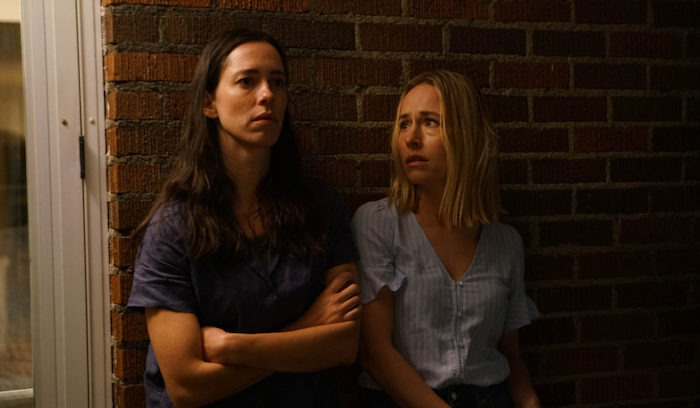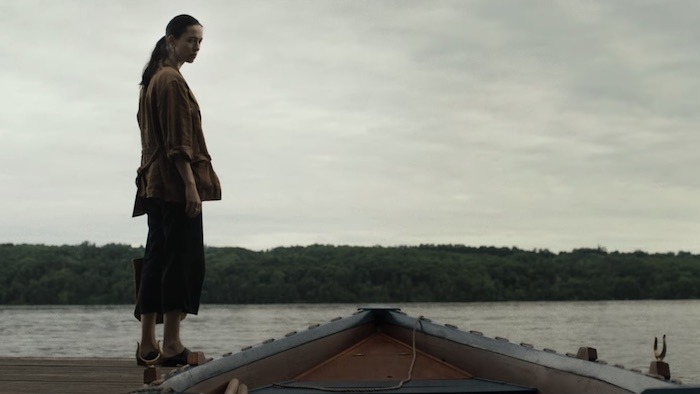'The Night House' Ending Explained: The Meaning Of David Bruckner's Metaphysical Nightmare
David Bruckner's The Night House starring the remarkable Rebecca Hall hits theaters today, and I'm very interested to see how the film makes people feel. A deeply metaphysical horror movie, it challenges a lot of our preconceived notions of life, existence, and everything. Whether or not those things permeated your mind on a regular basis ultimately doesn't matter — you'll think about it after you see The Night House. Though the film does tackle some very real threats and horrors, the ultimate villain is truly an abstract one.Here is your warning; from here on out, this is spoiler country!
Another very important warning is that this film and, as a result, this piece, discuss depression and suicide. Please do not push yourself to read through if it will cause any distress.
The Night House Ending
In the last third of the movie, Beth finds out that her late husband, Owen (Evan Jonigkeit), had been finding women who looked just like her. He'd take their pictures without them knowing, hiding as if he were stalking them. It seemed like he might have been having an affair, but...not. Her best friend, Claire (Sarah Goldberg), deeply concerned, encourages her to stop fishing for answers she may never find. "Not everything gets finished," she pleads. "You may never know what he was thinking. He's gone. You're not. You still have a life to live." So Beth agrees to pack a bag and leave their home for the time being. To stop digging, and stop letting him haunt her. While packing (and yelling at Owen's ghost), Madelyne (Stacy Martin), the woman from the bookstore, shows up. She's been to their house before. She tells Beth about the time Owen brought her there, how he made her feel safe, and that he showed her the other house. The Night House on the other side of the lake with the terrifying statue. She describes what started as kissing and quickly turned into violence as he started choking her.Freaked out and angry, Beth goes to the Night House to confront Owen. She's looking for answers, and she finds them beneath the floorboards. He'd been finding women who looked like her and murdering them in a ritualistic fashion. The reason why is still unknown. It's late, presumably the middle of the night, and she's alone. Terrified, she calls Claire and leaves what would be a concerning and confusing voicemail under literally any circumstances. She showers, trying to wash the horror off of her and shake away the shock of realizing she never really knew her husband. And he comes to her. Playing their song on the radio like he has several times before. Crying out for him in a moment of abject despair, he lets her touch him. And suddenly, the notion of being close to him, able to hold each other, is all-consuming. "I'm here," he says.She calls out to him, "Owen?" "No. I'm not Owen."The mystery is gone. The door to the bathroom slams shut behind her, and in the mirror, she watches as her husband kills a woman who looks almost exactly like her. This other thing mimics Owen's violence and smashes Beth's head against the mirror, sending her into this other place, a mirror version of their home. She watches as Owen binds the woman he's just killed in exactly the same way as the bound statue she found. Then she sees it. A human-shaped void that proceeds to follow her around this alternate version of her home. Suddenly, the void is in front of her and drags her down the hallway, passing duplicates of their bedroom over and over, watching Owen kill a different woman in each one. After being violently thrown down the stairs, she lands in her living room, Owen sitting on the couch, and her head lying in his lap, gently asleep as he strokes her hair. "You're not Owen," she says as he claims that she left the night they met. "I am what you felt when your heart stopped." Earlier in the film, she described the moment she died as a teenager. She was dead for four minutes. So when everyone invariably asked her what she saw, she would lie and say she didn't remember. She didn't want to disappoint them because there was just...nothing. "'You were right," she said to Claire that night, reciting Owen's suicide note. "There is nothing. Nothing is after you. You're safe now.' He told me I was right. Now I'm not so sure." This void, this Nothingness, tried corrupting Owen. It wanted her back. So it tried to get Owen to kill her. He tricked it for a little while by finding other women who looked like her to sacrifice instead. And it worked ... until it didn't. It consumed him, so he thought the only remaining way to save her was to eliminate the threat, which, at this point, was himself. Now, the Nothingness has engulfed her, sending her into a seemingly inescapable bleakness. She's forced to talk to it in the shape of Owen, in the boat where he killed himself, holding the gun that he used. Slowly, she angles the gun in her lap towards her face, as her head hangs down staring down the barrel. From her bleakness, Beth hears Claire call out to her from the dock. "It doesn't matter," it says to her. "Let go. Come back to me." She puts the gun down and opens her eyes as Claire swims toward the boat and pulls her out of it, dragging her to the dock where her neighbor, Mel (Vondie Curtis-Hall), is standing, ready to pull her out of the water."I'm here!" both Claire and Beth say to one another, each with their own distinct meaning. "You're safe now, you're going to be ok." All Beth can do is stare out at the empty boat. "What is it?" Mel asks. "There's nothing there." She answers bluntly: "I know."
But What Does it Mean?
David Bruckner said it himself at the film's Sundance premiere. Ultimately, the impact of the movie is dependent on the viewer. It comes down to what you find more terrifying — that ghosts exist or that they don't. Theoretically, it's kind of a glass half full or half empty situation, and it's all about perspective. That said, I can't tell you what it means because its meaning is fluid and open to interpretation. I can, however, tell you what I think it means. This Nothingness, this all-consuming void, serves as both a metaphor for abject hopelessness as well as an anthropomorphization of the emptiness that is existence. If you've dealt with depression — and I do mean Depression, not some bad days or weeks — you know what the Nothingness is. You've seen it. You've felt it. You've heard it say "it doesn't matter now" and had to snap yourself back to reality. I have. Multiple times since I was 16-years-old. I see this non-character and recognize it immediately because I am begrudgingly intimately familiar with it. And it's unmistakable. What comes along with that is this sense of futility, that emptiness of existence. Meaninglessness. The Nothingness. In my interview with Hall, I mentioned that I was a suicide survivor. When we were talking, I told her a hair more about it, but not much. My ex-boyfriend when I was 16 (we had broken up three months prior) committed suicide. And what followed after that felt like that scene in the boat for years. It took a decade for the feeling to subside enough to be able to only think about him periodically. It'll be 18 years this February. That feeling of emptiness that comes from losing someone to suicide specifically is indescribably painful. It feels meaningless and inexplicable, and part of the turmoil that comes from it is not being able to answer the question "why?" You may be able to get a clinical answer. Information about chemical imbalances (that are true), misuse of or stopping to take their medication (which is valid), or some terrible situation that drove them to feel like they had no other choice. But despite those answers, you're still left hollow. Empty. Waiting for a closure that just doesn't exist. Because there is no answer that will satisfy. But there are the people around you who love you and pull you back to reality. Away from the void. It never really goes away. But, eventually, with enough work and practice, its grip loosens and may even eventually fail altogether. So that's what I think it means. But that's because of who I am, what I've been through, and what I've felt. For you, it may be something entirely different. You may not even like it. But that's the beauty of film — it's a window into ourselves.


